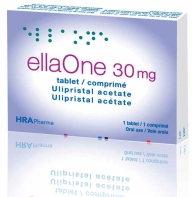Planned Parenthood dominates the abortion market — doing more than 25 percent of all abortions annually in the United States. So it’s no surprise the abortion business is taking credit for developing the new ella abortion drug.
 Cecile Richards, the president of the Planned Parenthood Federation of America, submitted a press release in response to the news that the maker of ella abortion drug, Watson Pharmaceuticals, has announced it is now available nationwide.
Cecile Richards, the president of the Planned Parenthood Federation of America, submitted a press release in response to the news that the maker of ella abortion drug, Watson Pharmaceuticals, has announced it is now available nationwide.
Planned Parenthood applauded the launch of the drug and contributed to the misinformation Watson, the FDA and other abortion advocates are putting forward by calling it an emergency contraceptive pill. It works within five days of intercourse, making it a clear abortifacient pill because conception will have already occurred in many cases developing a new, unique human being.
“Preventing unintended pregnancies is one of Planned Parenthood’s top priorities,” Richards said, claiming the “launch of ella in the U.S. gives American women one more option for backup birth control.”
But Richards tried to draw attention to Planned Parenthood’s participation in bringing ella to market.
“Planned Parenthood Federation of America played an integral role in the development of ella. Per FDA protocol, clinical trials were conducted, and ella was proven to maintain its high effectiveness over five days. Several Planned Parenthood affiliates participated in these clinical trials,” the press release said.
The release noted that Paul Fine, medical director of Planned Parenthood Gulf Coast “was lead author on a key study on the safety and effectiveness of ella in the February 2010 journal of Obstetrics and Gynecology. That study was based on the experience of 1,241 women who were patients at Planned Parenthood health centers.”
Vanessa Cullins, vice president for medical affairs, for PPFA, who has been frequently criticized before, appeared with Fine before the FDA committee that held a hearing on the drug before the agency approved it.
“Planned Parenthood has played a key role in the development of ella,” Richards bragged.
But what Planned Parenthood will not likely be doing is informing women that the drug can cause very early abortions because it destroys the life of an unborn child after conception and before implantation.
Concerned Women for America president Wendy Wright told LifeNews.com she is not happy with Watson Pharmaceuticals for making the prescription drug easy to obtain and for deceiving women in its promotional materials.
“The information for doctors admits that ella caused abortions in animal trials, yet the website and information for patients does not warn women of this,” she said.
Wright says Watson and the FDA are doing women a disservice by not making them aware of all of the possible complications and medical problems associated with the drug.
“Questions were raised that the drug may cause birth defects, yet the FDA allowed the drug company to avoid testing for birth defects. This is a deliberate effort to deceive women who would not otherwise take a drug that could harm their baby,” she said.
Charmaine Yoest, the president of Americans United for Life, has said the ella drug is chemically related to the abortion drug RU 486 that has killed and injured women and she says women will not likely be informed of potential problems.
“The FDA and abortion proponents are representing Ulipristal as if it were Plan B – however, in many respects, it’s simply the next generation of RU-486,” she says. “The American people need to know that Ulipristal works in the same way as RU-486 to kill an embryo before or after implantation. Ulipristal also has potential to be a dangerous drug that will place women’s lives in danger.”
AUL told the FDA that the abortion drug RU-486 is the parent compound of Ulipristal and it subjects women to drastic health risks, including risks of bacterial infection and hemorrhage.
To date, at least 13 women have died after using RU-486, and possibly dozens, according to the European maker of the mifepristone abortion drug. In addition, more than 1,100 women have experienced medical problems associated with the abortion drug, according to the FDA’s own 2006 figures.
Ulipristal may be subject to similar risks, and unsupervised, over-the-counter access would likely put countless women’s lives in danger, AUL said in its testimony.
Studies on women showed the drug can abort an existing pregnancy after implantation.
Anna Glasier, of NHS Lothian in Edinburgh, led a study of more than 5,500 women in the UK published online in The Lancet medical journal. It found fewer pregnancies among those women given the ellaOne drug within five days of intercourse. And for women who took the drug between 3-5 days after having sex, only women taking the traditional morning after pill became pregnant, with the women taking ella not conceiving or likely having abortions.
Dr. Donna Harrison, the president of the American Association of Pro-Life Obstetricians and Gynecologists agrees with the assessment of ellaOne (Ulipristal) as an abortion drug.
“I think it’s important that the pro-life community recognize exactly what Ulipristal is, and how it works, so they are not fooled,” she told LifeNews.com in January.







